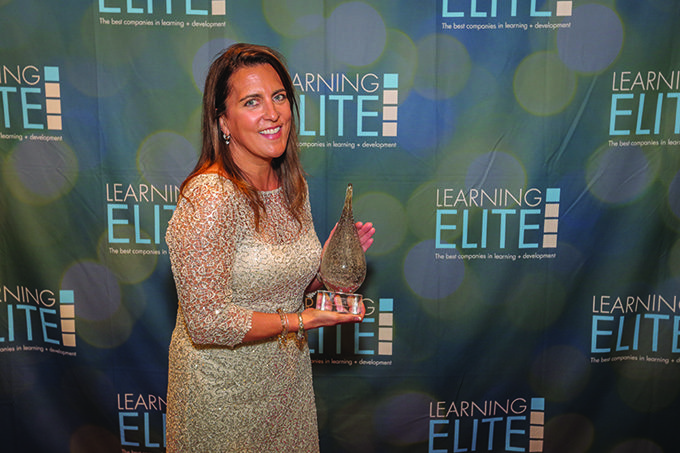
The learning leaders at PricewaterhouseCoopers are students of history. When asked about her learning strategy, Chief Learning Officer Katrina Salem takes it back to the beginning.
“The industry that we’re in was built on an apprenticeship model,” she said. “Historically, we as learning leaders are grounded in the principle that people learn by doing, and that they learn from one another. That apprenticeship model continues to feed how we think about and execute learning today.”
With an organization that spans 157 countries and has more than 208,000 employees, senior staff members’ ability to facilitate learning and impart their knowledge to the workforce as a whole is key to ensure that PwC delivers value to its clients.
Providing a high level of client service requires senior-level staff to commit to developing themselves. In 2015, the firm invested $224 million to fund its three-pronged Leadership Development Experience, which includes learning from others, learning by doing and formal learning. But the organization didn’t stop after writing the check. More than 90 percent of the 3 million training hours completed that year were delivered by PwC Partners and senior-level staff, according to the company.
“Our senior level leaders act as both consumers and teachers in our classes,” Salem said. “I see that as fundamental to the way our learning system operates.”
Last year alone, all senior partners, including U.S. Chairman Bob Moritz, completed more than 66 hours of training each to grow and hone their technical and interpersonal skills, Salem said. They then took that knowledge into formal and informal coaching sessions to deliver what they learned.
Contributing to the spread of knowledge is the fact that, firmwide, the U.S. leadership team, the chief learning officer, and all lines of service heads meet twice annually to determine strategic vision and priorities for development and ensure these align with the company’s planning and budgeting cycle.
While PwC wants to provide as much structure possible, it is also aware of its workforce’s on-demand learning needs. Staff concentrate on 16 key industries — such as automotive and energy, homeland security and entertainment — which means that learning needs to be personal, and it often needs to happen immediately.
To achieve that goal, PwC created a social collaboration platform called Spark to enable learners to access course materials and assignments, complete prerequisites and access reinforcement materials when the employee feels they need it. These materials are also available on mobile devices on the learning app IQ. In 2015, 2,835 U.S. staff launched more than 9,060 pieces of content in IQ, totaling more than 36,000 hours learning on their mobile devices.
“Technology is an enabler for anything,” said Jonathan Amy, a learning strategies and performance leader at PwC. “We want our employees to access what they need, when they need it and in a way that is easiest for them.”
Given the rate technology is advancing, Amy said the personalized learning experience is developing to the point of prediction. “To turn a company name into a verb, we want to Amazon or Netflix how people learn,” he said. “We want employees to turn on a mobile device and have it recognize that they’re starting with a new client, and offer information about the industry to make that employee as effective as possible in the field.”
Sarah Sipek is a Chief Learning Officer associate editor. Comment below, or email editor@CLOmedia.com.














